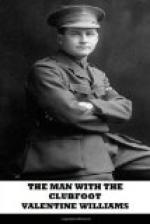The official pointed to a pigeon-hole and I took care to speak loud enough for him to hear me ask for a second-class ticket, single, to Munich.
I walked upstairs and presented my Munich ticket to the collector at the barrier. Then I hurried past the main-line platforms over the suburban side, where I gave up my platform ticket and descended again to the street.
It was just on the half-hour as I came out of the station. Not a cab to be seen! I hastened as fast as my legs would carry me until, breathless and panting, I reached the Potsdam terminus. The clock over the station pointed to 12.39.
A long queue, composed mostly of soldiers returning to Belgium and the front, stood in front of the booking-office. The military were getting their warrants changed for tickets. I chafed at the delay, but it was actually this circumstance which afforded me the chance of getting my ticket for Duesseldorf without leaving any clue behind.
A big, bearded Landsturm man with a kind face was at the pigeon-hole.
“I am very late for my train, my friend,” I said, “would you get me a third-class single for Duesseldorf?” I handed him a twenty-mark note.
“Right you are,” he answered readily.
“There,” he said, handing me my ticket and a handful of change, “and lucky you are to be going to the Rhine. I’m from the Rhine myself and now I’m going back to guarding the bridges in Belgium!”
I thanked him and wished him luck. Here at least was a witness who was not likely to trouble me. And with a thankful heart I bolted on to the platform and caught the train.
Third-class travel in Germany is not a hobby to be cultivated if your means allow the luxury of better accommodation. The travelling German has a habit of taking off his boots when he journeys in the train by night—and a carriageful of lower middle-class Huns, thus unshod, in the temperature at which railway compartments are habitually kept in Germany, is an environment which makes neither for comfort nor for sleep.
The atmosphere, indeed, was so unbearable that I spent most of the night in the corridor. Here I was able to destroy the papers of Julius Zimmermann, waiter ... I felt I was in greater danger whilst I had them on me ... and to assure myself that my precious document was in its usual place—in my portfolio. It was then I made the discovery, annihilating at the first shock, that my silver badge had disappeared. I could not remember what I had done with it in the excitement of my escape from Haase’s. I remembered having it in my hand and showing it to the police at the top of the stairs, but after that my mind was a blank. I could only imagine I must have carried it unconsciously in my hand and then dropped it unwittingly. I looked at the place where it had been clasped on my braces: it was not there and I searched all my pockets for it in vain.
I had relied upon it as a stand-by in case there were trouble at the station in Duesseldorf. Now I found myself defenceless if I were challenged. It was a hard knock, but I consoled myself by the reflection that, by now, Clubfoot knew I had this badge ... it would doubtless figure in any description circulated about me.




